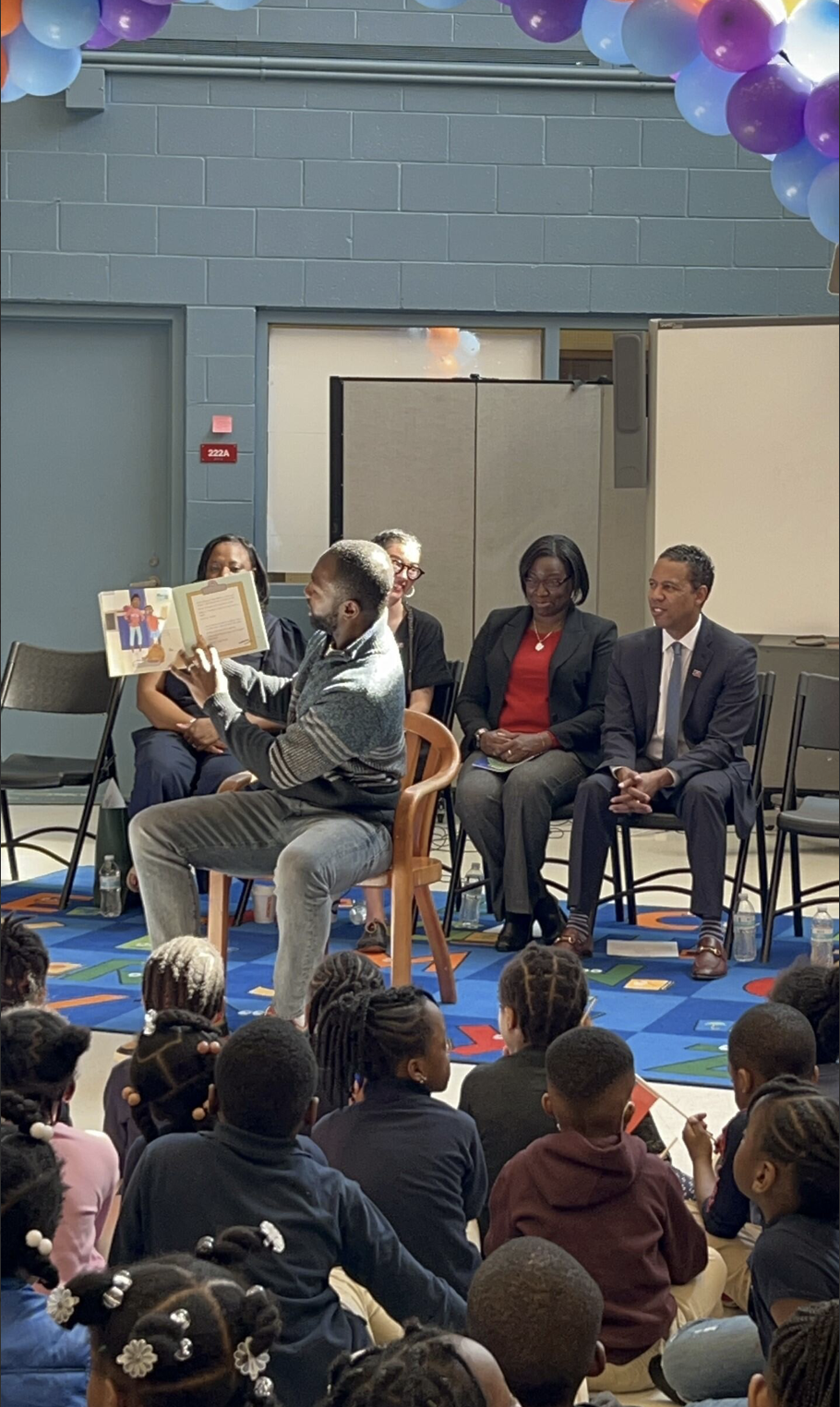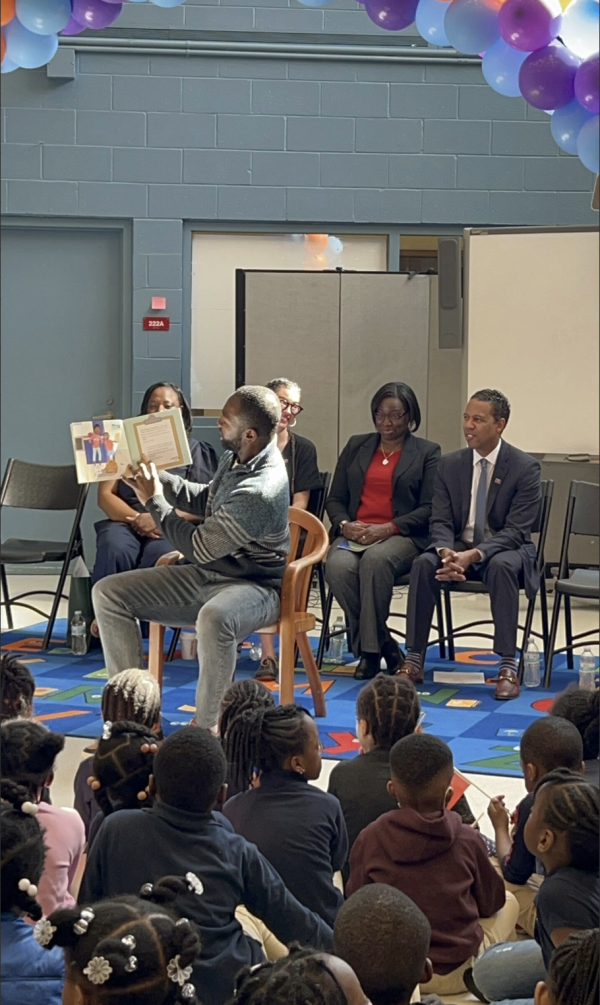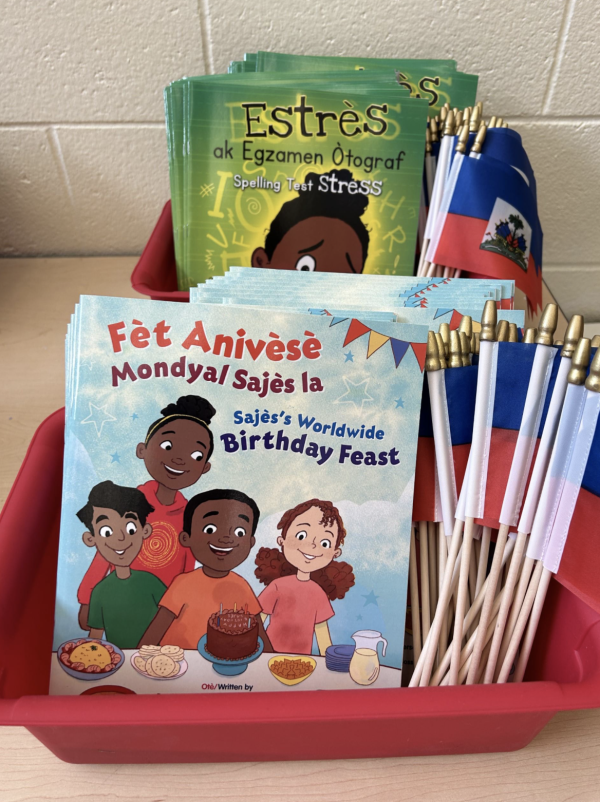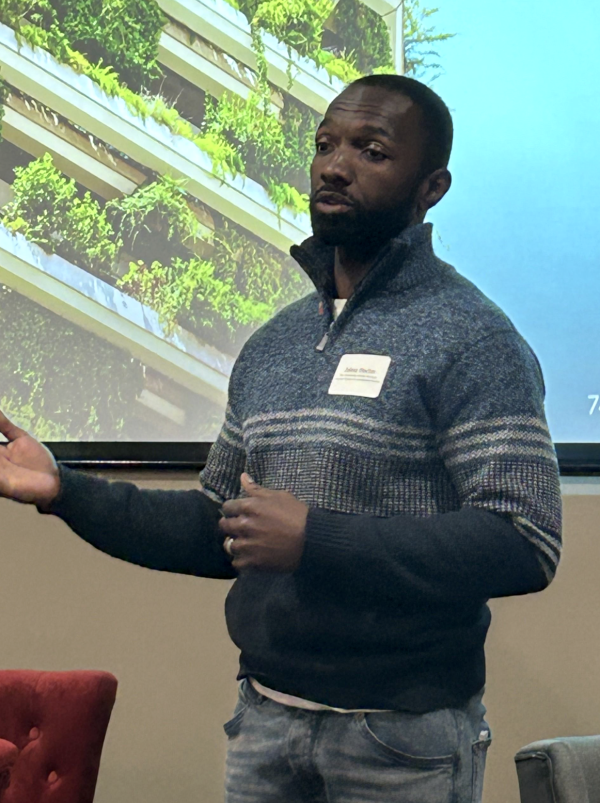KID REPORTERS’ NOTEBOOK
Jamie Hector Introduces Haitian-Themed Book Collection


Actor and author Jamie Hector reads to children of Haitian descent in Boston, Massachusetts.
Last spring, Scholastic launched a new classroom library called Our Community: Haitian Heritage. The collection is designed for students in grades K-3. It explores and celebrates the Haitian experience for children who live in the Caribbean country and elsewhere. The illustrated books are almost entirely written by authors of Haitian descent. Many titles have even been translated into Haitian Creole.
The collection was created in collaboration with actor and storyteller Jamie Hector. As a child, Hector spoke Haitian Creole with his parents, who immigrated to the United States from Haiti.
Hector is widely known for his portrayal of Marlo Stanfield in The Wire, a popular TV series that aired in the early 2000s. He co-wrote the Chloé Wonders book series, which was transadapted into Haitian Creole for Our Community.
I recently spoke with Hector about his passion for acting and writing. We also talked about Moving Mountains, the nonprofit organization that he co-founded with his partner, Alaine Roberson, who is co-author of the Chloé Wonders series. Moving Mountains provides training in the performing arts to children in underserved urban communities.
Here are highlights from my conversation with Hector, which has been edited for length and clarity.
Could you tell me about the Chloé Wonders titles?
The books are based on my children. Chloe, 14, is very curious. She loves to ask questions. We decided to create books in which she would not only be able to ask questions, but also to solve problems. My seven-year-old son, Sajes, on the other hand, is a problem solver. We incorporated him into the books, too.
How did you get involved in Our Community: Haitian Heritage?
The Chloé Wonders books, which are dedicated to our community, were the starting point. Ali [Roberson] and I got together with the Scholastic team to see how we could further amplify Haitian culture. The new library has materials for young Haitians and Haitian Americans—and even those who are not Haitian or Haitian American—to learn about Haiti.
We transadapted Chloé Wonders. [Since Haitian Creole is primarily a spoken language, creating an exact translation isn’t possible.] We also involved other authors in the project who are from, or love, the beautiful country of Haiti. Our Community: Haitian Heritage shares Haiti’s writings, history, and culture with the world.

Our Community: Haitian Heritage, a new classroom library from Scholastic, features stories in English and English/Haitian Creole.
How do you think this collection will benefit children of Haitian descent?
I hope it will encourage them to start reading early and explore their culture.
What do you hope non-Haitian students will take away from these books?
When I was growing up, my mother told me stories about Haiti. She talked about its natural beauty, its music, its art, and food. I want kids to learn about the amazing people in Haiti and about those who live in the U.S. and elsewhere.
Some of the titles in Our Communmity are bilingual. Could you briefly explain the origins of Haitian Creole?
Haitian Creole is a mix of French and several African dialects. Haitian Creole resembles French, but it’s considered a different language than French.
What challenges did you encounter translating and adapting these books, especially since Creole is mainly a spoken language?
That’s a good question. Translating any language can be challenging. This is especially true when it comes to children’s books, because the focus is on grammar. When we tell stories, we sometimes want to tell the story as we would naturally speak, which is not always grammatically correct when translated into a different language.
You grew up in Brooklyn as the child of Haitian immigrants. Could you tell us about your childhood?
I had a lot of fun growing up in Brooklyn, a lot of fun. We played skully, kick the can, and stoop ball. I would ride my bike for miles. Our neighborhood, Flatbush, is home to the largest community of Haitian Americans in the U.S.
Did you speak Creole or English at home?
Creole. My mother was, and still is, strongly attached to Creole, her native tongue. But at school and with my friends, I spoke English.
Were there other Creole speakers at your school?
Yes, but very few teachers. Mostly, it was my friends who spoke Creole.

Hector said that he feels proud of his Haitian heritage “every time I see my family come together to celebrate with food and music.”
What makes you proud of your Haitian heritage?
Every time I see my family come together to celebrate with food and music, I feel proud. Prominent figures who are still in Haiti, or who have settled in other countries—working as doctors, lawyers and engineers—also make me proud. When they succeed, all Haitians succeed. It’s like we all did it.
How did you discover your passion for acting?
A friend invited me to a theater company. While there, I was introduced to actors, writers, and vocalists. That sparked something inside of me.
You founded Moving Mountains, a nonprofit organization that gives kids a chance to study acting for free. Could you describe the organization and why you started it?
We founded Moving Mountains in 2007. The focus is on developing skills, talents, and abilities in youth, while also building character. We started the organization because there was a lack of free organizations in the community. I went to the Lee Strasberg Institute, which was very expensive. We aim to provide that same level of craftsmanship, and that same level of study and training, for free. Young people can automatically be involved in this great space of acting, creating, and collaboration. Moving Mountains has grown tremendously over the past 17 years.
What advice do you have for aspiring writers and actors?
If there is something that you love to do, then do it. If you’re passionate, you have to understand that it’s not going to be easy. But the work you put in, the time and dedication—while keeping that love and passion alive—will take you the distance. I also believe that faith in God will move mountains.
